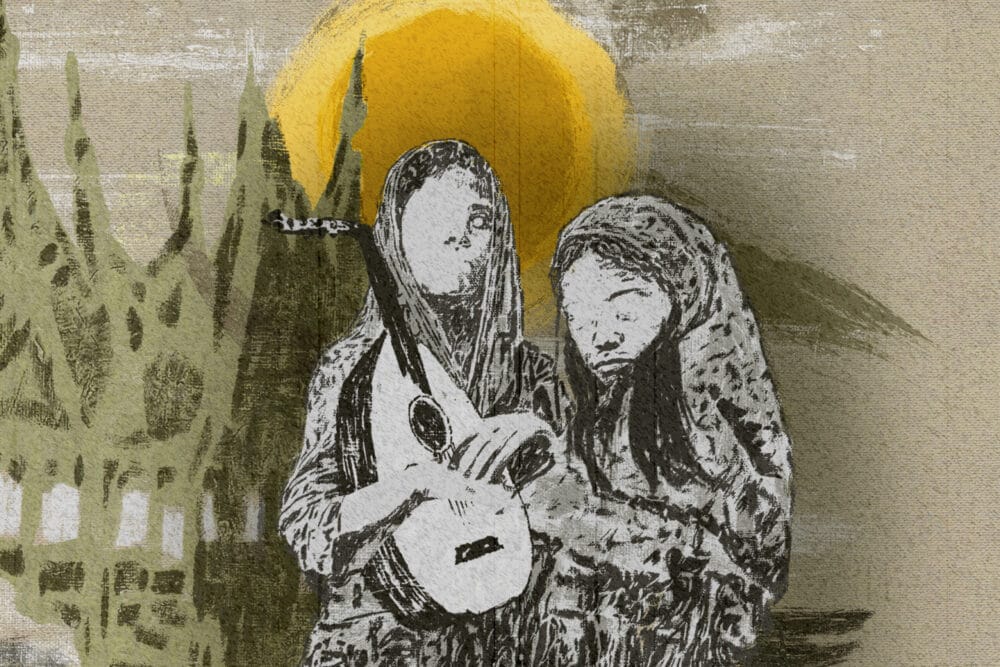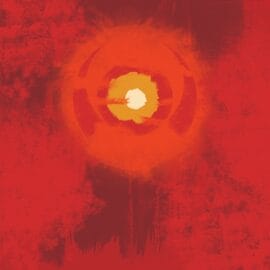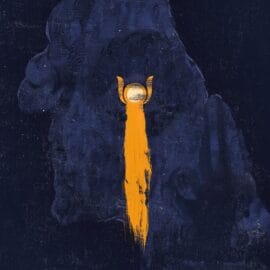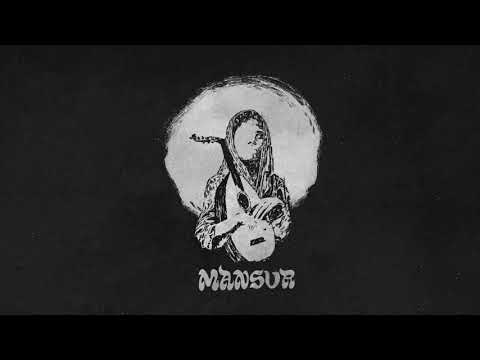Dark jazz fans might know Dutchman Jason Köhnen from his former bands The Kilimanjaro Darkjazz Ensemble and The Mount Fuji Doomjazz Corporation. Together with the Russian Dimitry El-Demerdashi (ex-Phurpa), he now focuses on more spiritual sounds with MANSUR. In our interview, Köhnen tells us how it all came about, what you see when you look into the sun with your eyes closed and what Marcus Aurelius has to do with all this.

How are you doing – are you all well and save, despite this corona situation?
Yes, I live in a reality where I do not fear dying and enjoy every day I am alive, so I am not consuming the constant fear bombardments from governments. I stay healthy and hope to get my liberties returned soon.
Your new band is called MANSUR – can you tell us more about it?
MANSUR is a project I share with Dmitry and Martina, its new experimentaitons into mysterious unknown worlds. Our goal is to be some kind of musical vessel for listeners to disappear into new realms.
You run MANSUR together with Dimitry El-Demerdashi (ex-Phurpa). Where do you know each other from, how did the idea for the joint project come about?
We met each other in 2018, we performed together and developped some kind of musical link. I personally really admire Dmitry’s style of playing and his musical way of thinking. Maybe because we are different there is a mutual musical respect in our own ways of working and creating art. Our communication and collaborations are very fluid, we hardly need any words to explain things to each other, so its great to have this natural way of working together. Its very liberating.
 Martina Horváth does the vocals – how did she come into the group and is she also part of the band or just a session musician?
Martina Horváth does the vocals – how did she come into the group and is she also part of the band or just a session musician?
Martina is a full member of the group. Her vocals on ‘Temple’ are so unique and fitting to the music that she had no choice but to stay in the group. (laughs)
As far as I know, you actually come from jazz – would you say that MANSUR also contains a jazz component, and what is this most noticeable in?
I originally come from metal, but have been influenced by so many genres that its hard to really pin point something specific. But in regards to your question, I guess there are some jazz components in there, definitely regarding the free spirit of jazz; experimentations and spirit, I hope theres a bit of Coltrane’s and Pharoah Sanders’ spirit floating about in our music somewhere, that would be pretty nice.
How did you go about this personal musical change, how did you get into this kind of mystical, spiritually inclined music? What inspires you or you in this respect – be it from the field of music or a spiritual discipline?
I think when you hit rock bottom in life this ‘spirituality’ or whatever you want to call rebuilding your foundations happens by itself. It comes and finds you, and you can either let it inside and guide you on your own personal journey or not. For me personally there have been specific teachings that have helped me, but in the end they all basically return to the same source. Take the path which suits you best I would say.
 Earlier with The Kilimanjaro Darkjazz Ensemble and The Mount Fuji Doomjazz Corporation you improvised a lot – does that also play a role in songwriting with MANSUR, or do you rather compose fixed songs here?
Earlier with The Kilimanjaro Darkjazz Ensemble and The Mount Fuji Doomjazz Corporation you improvised a lot – does that also play a role in songwriting with MANSUR, or do you rather compose fixed songs here?
Dmitry and myself dont really have a fixed way of composing, it goes both ways actually. I mostly send Dmitry fixed ideas to work with, while he can send me improvisations, it is what actually keeps the MANSUR songs interesting. We will be releasing a live/improv album this year with MANSUR called ‘Minotaurus’, you will hear the difference when compostions are not fixed like with ‘Temple’ and ‘Karma’, it will bring a different darker vibe.
How did the collaboration – from the creative part to the recording – take place, digitally or in real-life-meetings?
Everything goes through the internet. I mean we have Russia, Hungary and The Netherlands, not the closest countries to jump into the rehearsal room for a quick jam. But the contact through the net works absolutely fine. It also gives you your own tempo to work on the project. Its very flexible.
How would you describe the situation for which this music was composed?
I compose my music from a place that doesn’t exist. That might sound strange, but where I compose from (this uncharterred realm) is where I want to take the listener to on this musical journey. I try to translate what I see and experience in this unknown world to a specific composition, the music is the medium to open up the listeners imangination and travel to that place with us. It’s a magical place and I like being there.
 The first EP was called „Temple“, now it continues with „Karma“ – does MANSUR, with music and lyrics, have a concrete concept that possibly deals with Buddhism/Hinduism – and if so: where does your fascination for these themes come from? In your earlier bands, at least musically, there was nothing to be heard of this?
The first EP was called „Temple“, now it continues with „Karma“ – does MANSUR, with music and lyrics, have a concrete concept that possibly deals with Buddhism/Hinduism – and if so: where does your fascination for these themes come from? In your earlier bands, at least musically, there was nothing to be heard of this?
I dont like framing the concept of ‘spirituality’ to the music as such. Its there, yes, but we are all spiritual in some form, for these two albums it surely has ‘spiritual’ connotations, but the references to the teachings are the universal ones. I think I have just been involved with them much more over the past years and they have become an integral part to the start and development of the project.
How would you describe the album in one sentence?
Transcendental.
Thats an interesting keyword: Also visually, the whole layout is very oriental. Thinking critically: How much „oriental“ can a western band go without being suspected of cultural appropriation, without seeming affected?
I have to disagree. I dont see any oriental in the artwork. Maybe the logo / typography of the name MANSUR, but its the font used by Pharoah Sanders on several of his albums, so its in a way hommage to him as a musician and his musical philosophy. ‘Karma’ has the image of Marcus Aurelius, he was a Roman emperor. Most of the titles on ‘Karma’ are in latin. So thats pretty western orientated.
As for cultural appropriation, I find this one of the most uninteresting terms in our modern day. Its a delusional concept. My origins are Dutch and Indonesian and I grew up in Spain, so I am a bastard child of the world. Cultural appropriation is a purely divisive term. It used to be called ‘multi-cultural’ a term that meant unity, but somehow and sometime it changed to ‘cultural appropriation’ to make us separate from each other. I’m not playing that game. People who occupy or get offended with the term need to ask themselves what they are getting offended by.
 Talking about the artworks: The EP had an really bright artwork, the album cover is quite dark. Is there a particular reason for that?
Talking about the artworks: The EP had an really bright artwork, the album cover is quite dark. Is there a particular reason for that?
The ‘Temple’ artwork represents the image of when you have your eyes closed and you look into the bright sun, you see a collection of warm colors on the back of your retina, thats what the artwork represents. The symbol, represents the equinoxes, the apis bull, the minoans, phoenicians or any past lost civilization, it represents this specific world you travel to on our musical journey. It represents the worshipping of the sun. The red color represents the blood from the menstrual cycle of the divine female, from her ‘Temple’.
The ‘Karma’ artwork represents the broken image of Marcus Aurelius. It represents courage, strength, integrity, accepting death, accepting your flaws and the pursuit of inner growth… What you give to the universe is what you will get back from the universe. The blue represents the calm, the protecting guidance of the masculine.
One last provocative question: The metal scene is currently being „overrun“ by various bands that have devoted themselves to atmospheric, archaic and spiritual sounds in some form or another – led by bands like Wardruna, who play music on old Norse instruments, Heilung, or – albeit on a different level – Phurpa. First of all, do you know those bands/this development, and then: do you also see a chance for MANSUR in this, in terms of your popularity or commercial success?
I can’t speak for any other band, I dont really care what other people’s motivations are to make music. Personally I support any form of transcendetalism in music, it means people are getting more in touch with the metaphysical, thats great, it can lead to personal growth. Regarding it becoming commercial or popular, I don’t really care either, if music is good and people like it and the group sells well… good for them! They probably have a families and need to pay rent. I have nothing against succes as long as I stay true to my art. What other people do is up to them, I am not here to judge others.
Thank you very much for the interview, I hope you had a good time answering! Let’s wrap it up with our traditional brainstorming:
Black Metal: “De Mysteriis Dom Sathanas”… masterpiece.
Karma: Be good to the universe, the universe will be good to you.
Jeff Bezos: Antithesis of a virtuous man.
Your favorite Jazz Metal act: Shining
MANSUR in 10 years: MANSUR
Once again thanks for your time. The last words are yours: Thanks. Be good to yourself and make the best of life. You have one chance at it.
Dieses Interview wurde per E-Mail geführt.
Zur besseren Lesbarkeit wurden Smilies ersetzt.

